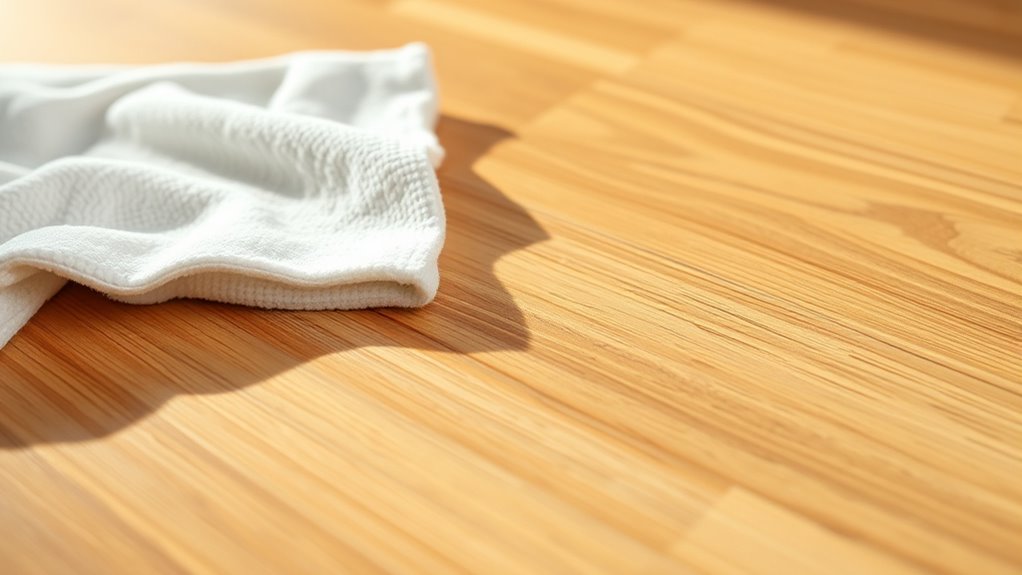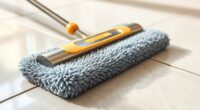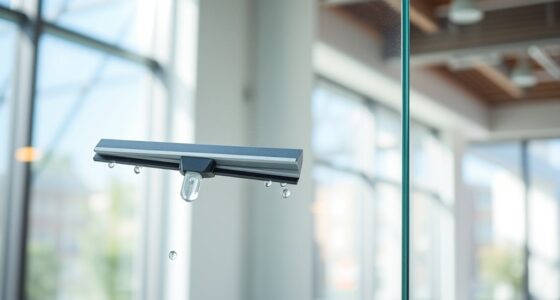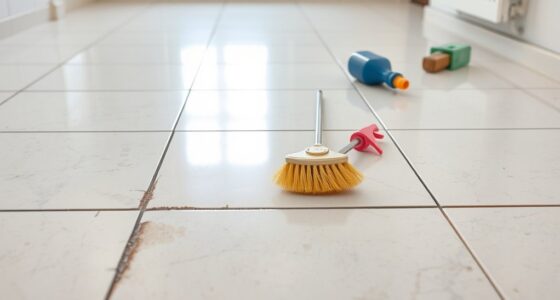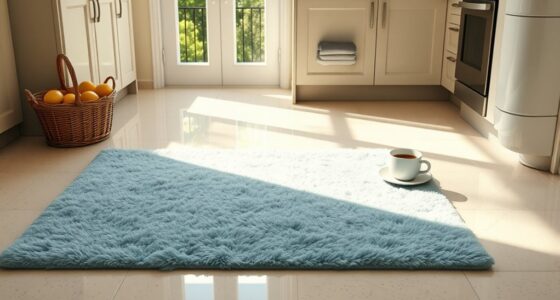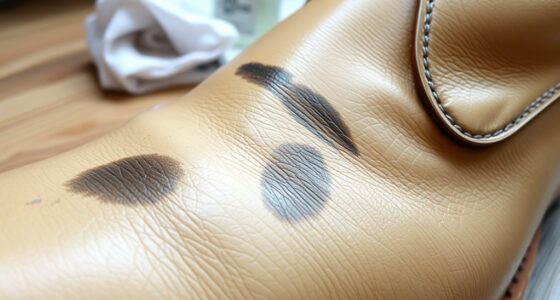Before you mop your vinyl plank, start by removing loose dirt and debris with a soft broom or vacuum to prevent scratching. Protect your furniture legs with pads and lift heavy items instead of dragging them across the floor. Use a damp microfiber mop with a vinyl-safe cleaner and avoid excessive water. Keeping these steps in mind can considerably reduce scratches. Want to discover more tips to keep your floors pristine? Continue exploring for expert advice.
Key Takeaways
- Sweep or vacuum thoroughly to remove loose dirt and grit before mopping.
- Install protective pads on furniture legs to prevent scratches during cleaning.
- Use a damp microfiber mop with vinyl-safe cleaning solutions, avoiding excessive water.
- Remove shoes or wear soft-soled footwear to minimize foot traffic damage.
- Inspect and replace dirty or grit-laden mop heads to prevent surface scratching.
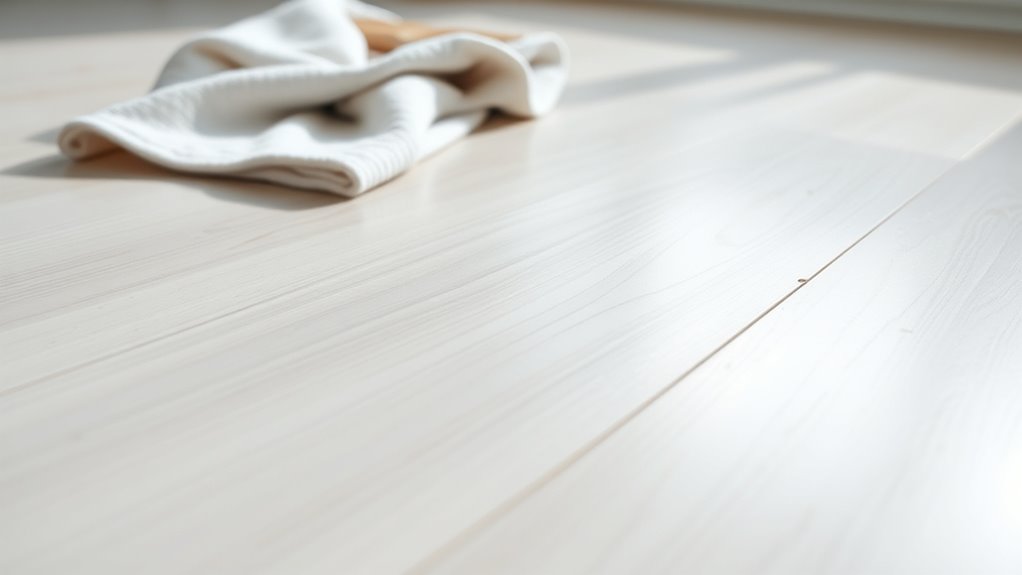
Scratches on vinyl plank flooring can quickly ruin its appearance, but fortunately, you can take simple steps to prevent and minimize them. Before you even think about mopping, it’s vital to focus on your cleaning tools and the surfaces that come into contact with them. Using the right cleaning tools is essential; opt for a soft-bristled broom or a microfiber dust mop to sweep away dirt and debris. Avoid using harsh brushes or abrasive scrubbers that can scratch the surface. Regularly removing dirt prevents grit from settling into the planks, which can cause scratching when you walk or move furniture across the floor.
Protect your vinyl flooring by using soft tools and removing dirt regularly to prevent scratches.
Another effective way to protect your vinyl flooring is by installing protective pads on the bottoms of furniture legs. These pads act as a cushion, preventing sharp edges from directly contacting the floor whenever you move furniture. When you’re about to clean, check that all furniture is lifted carefully rather than dragged across the surface, which can cause scratches even if you have protective pads in place. This simple step reduces friction and minimizes the risk of damaging the vinyl.
When preparing for mopping, make sure your cleaning tools are clean and free of debris. Dirty mop heads or cloths can carry grit that scratches the surface as you clean. Use a damp microfiber mop or cloth with a gentle cleaning solution designed specifically for vinyl floors. Avoid excessive water, as standing moisture can damage the underlying adhesive or cause swelling, but also make sure the mop isn’t so wet that it leaves streaks or residue. Before mopping, give the floor a quick sweep or vacuum to pick up loose dirt, pet hair, and small particles that could scratch the surface during cleaning.
In addition, think about the environment where your vinyl plank flooring is installed. High heels, pet nails, and even certain types of footwear can leave scratches over time. Encourage family members and visitors to remove shoes or wear soft-soled footwear. Regularly trim pets’ nails to avoid accidental scratches, especially when they run or jump across the floor. Incorporating preventive measures, such as applying protective pads and being cautious with footwear, can further safeguard your floors from scratches.
Finally, always follow the manufacturer’s cleaning instructions. Using the wrong cleaning products or methods can weaken the vinyl and make it more susceptible to scratches. By taking these precautions—using the right cleaning tools, applying protective pads, and being mindful of foot traffic—you’ll maintain the beauty of your vinyl plank flooring and keep it looking pristine for years to come.
Frequently Asked Questions
Can I Use Vinegar to Clean Vinyl Plank Flooring?
Yes, you can use vinegar cleaning on vinyl plank flooring, but you should be cautious. Vinegar is a natural cleaner, but its acidity can affect the pH balance considerations of your flooring. To avoid damage, dilute vinegar with water—about one cup per gallon—and avoid using it undiluted. Always test a small, hidden area first. This way, you’ll clean effectively without risking the finish or surface.
How Often Should I Mop Vinyl Plank Floors?
You should mop your vinyl plank floors once a week to keep them looking fresh and avoid dirt buildup. Sticking to a consistent cleaning schedule is key—don’t let grime accumulate like ashes in a fireplace. Over-mopping can damage the surface, so adjust based on foot traffic and spills. Regular light mopping prevents scratches and keeps your floors gleaming, making maintenance a breeze.
Are There Specific Cleaners to Avoid for Vinyl Floors?
Avoid using abrasive cleaners and wax-based products on your vinyl floors, as they can cause damage and dull the surface. Instead, opt for gentle, pH-neutral cleaners specifically designed for vinyl. You should also steer clear of harsh chemicals like ammonia or bleach, which can weaken the material. Always read labels carefully, and test any new cleaner in a small, hidden area before applying it broadly to keep your floors looking their best.
What Tools Prevent Scratches During Cleaning?
You can prevent scratches during cleaning by choosing the right tools and using proper mop techniques. Opt for a soft-bristled broom or a microfiber mop to gently lift dirt without scratching. When mopping, use light, even pressure and avoid dragging heavy or abrasive tools across the floor. Proper tool selection and gentle motions keep your vinyl plank floors scratch-free and looking their best.
How Do I Remove Stubborn Scratches Safely?
Sure, you can pretend your vinyl plank is a masterpiece, but stubborn scratches demand some real repair magic. Gently buff the scratches with a soft cloth and a vinyl-safe repair kit or apply a protective coating designed for scratches repair. Skip harsh abrasives—they’ll only worsen your “artwork.” Think of it as giving your floor a tiny spa treatment, restoring its shine and hiding those pesky marks. Easy peasy!
Conclusion
By following these simple steps, you can protect your vinyl plank flooring from scratches and keep it looking brand new. Remember, regular cleaning and using the right tools make a significant difference—studies show that proper maintenance can extend the lifespan of your floors by up to 30%. So, take care of your vinyl planks today, and they’ll continue to enhance your space with their durability and beauty for years to come.
